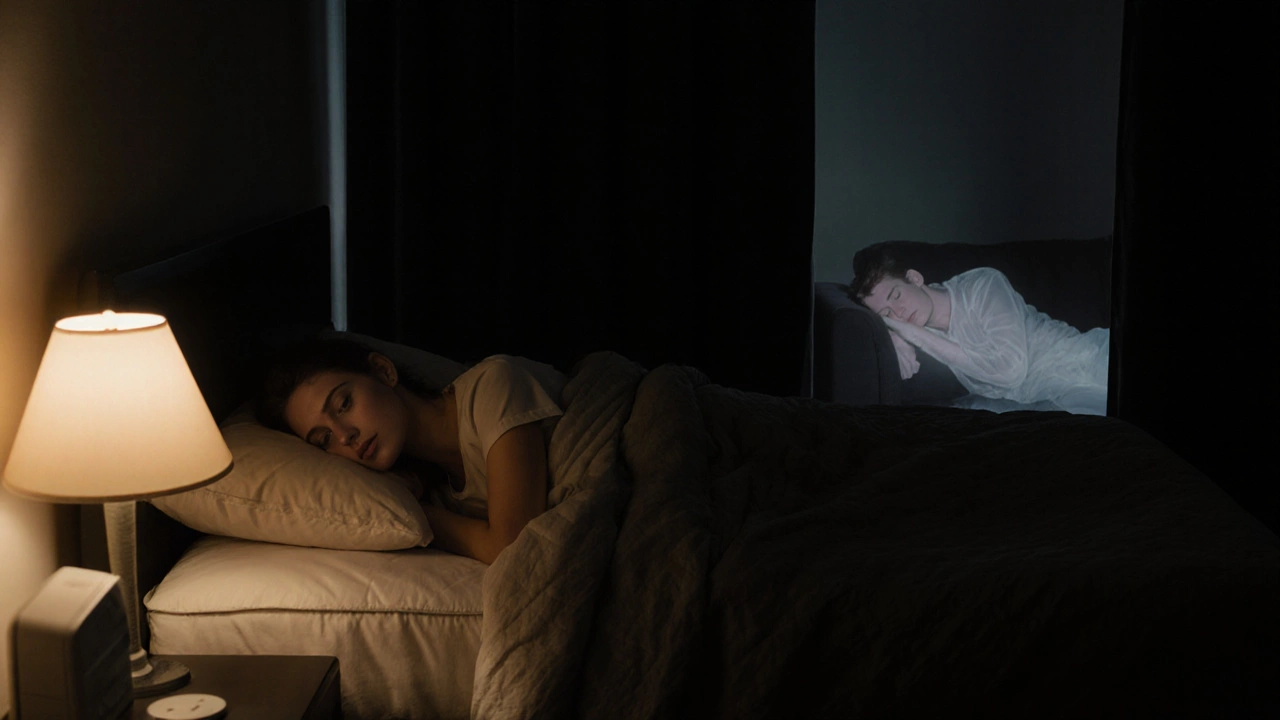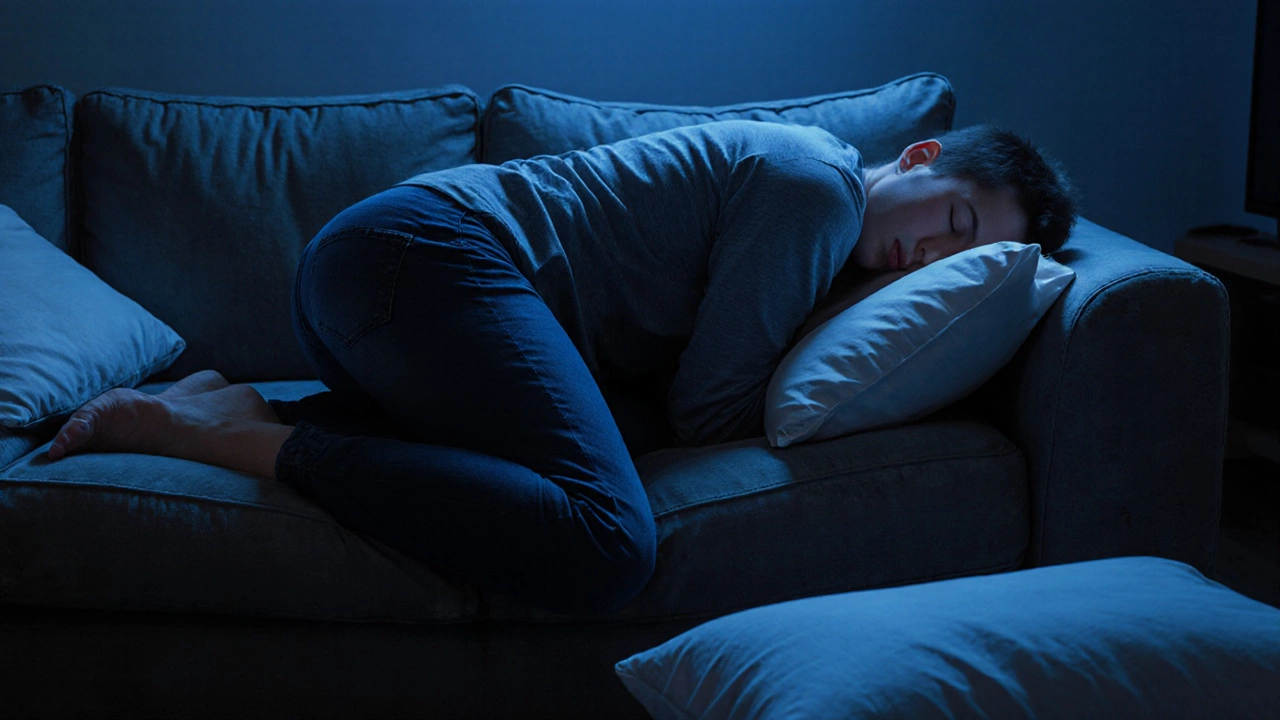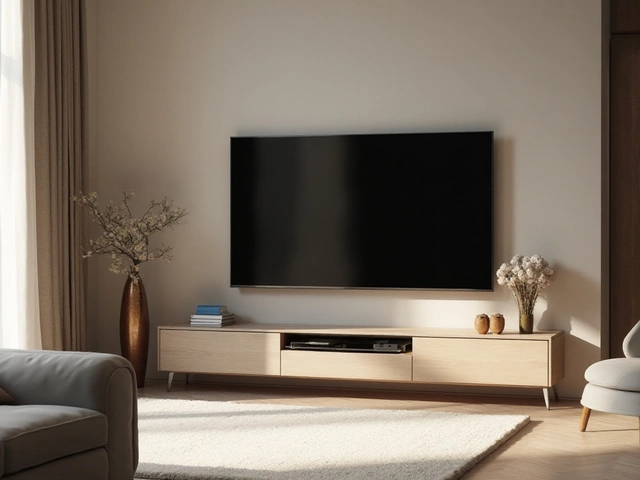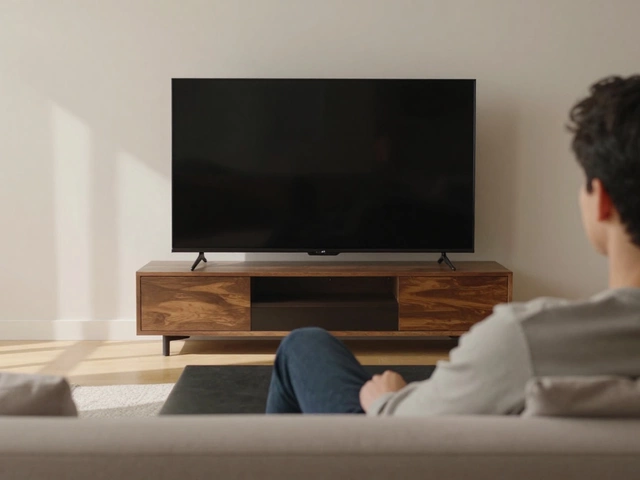Couch Sleep Risk Calculator
Based on your responses, you're missing approximately of deep sleep compared to sleeping on a proper bed.
- ✅ Replace couch naps with 20-minute timed rest sessions
- ✅ Use a supportive chair with armrests for naps
- ✅ Keep your bedroom dark, cool, and screen-free 60 minutes before sleep
- ✅ Consider a quality mattress topper for your sofa bed if needed
You’ve had a long day. The TV’s on, the blanket’s warm, and before you know it, you’re wide awake one minute and snoring the next-curled up on the couch like a human comma. It feels harmless. Maybe even cozy. But if this happens more than once a week, your body is paying the price-and you might not even realize it.
Your spine isn’t designed for couch sleeping
Your spine has natural curves. When you sit upright, those curves stay balanced. When you lie flat on a mattress, they’re supported. But on a couch? The backrest is too high, the seat too soft, and the armrests? They force your neck into a twist. You end up with your head tilted sideways, your lower back sinking, and your hips bent at an awkward angle. This isn’t just uncomfortable-it’s biomechanically wrong.
A 2023 study from the University of Auckland’s biomechanics lab tracked 87 adults who regularly slept on sofas. Over 72% reported waking up with lower back pain within a week. That’s not coincidence. It’s physics. Your lumbar spine loses its natural lordosis curve when unsupported. Without proper alignment, pressure builds on discs and nerves. Over time, that leads to chronic pain, muscle spasms, and even nerve pinching.
Sleep quality plummets
You think you slept well because you were out cold. But sleep isn’t just about closing your eyes. It’s about cycling through deep, restorative stages-especially REM and slow-wave sleep. Couches disrupt this.
Most sofas don’t give your body enough support to fully relax. Your muscles stay tense trying to hold you in place. You shift constantly. You wake up every 20-30 minutes without realizing it. A 2024 sleep tracker study from SleepTech NZ found that people who slept on couches spent 40% less time in deep sleep compared to those who slept in beds. Their heart rates stayed elevated. Their breathing was more irregular. They woke up feeling more tired than when they went to sleep.
And it’s not just about quantity. It’s about quality. If you’re waking up gasping for air, or your arm goes numb every night, your body is screaming for better support.
Neck and shoulder pain are silent side effects
How many times have you woken up with your neck stiff, your shoulder aching, or your hand tingling? That’s not random. It’s posture.
On a couch, your head is either propped up on a pillow that’s too high, too low, or not there at all. Your neck bends sideways to rest on the armrest. Your shoulders hunch forward. Your upper trapezius muscles scream in protest. Over weeks, this leads to tension headaches, frozen shoulder, and even tingling down your arms-signs of nerve compression.
One client I worked with in Auckland, a 52-year-old teacher, came in with chronic neck pain. She swore it started after she began napping on the couch while watching evening news. After switching to a proper bed with a supportive pillow, her pain dropped by 80% in three weeks. She didn’t need surgery. She just needed better alignment.

Sofa beds aren’t the answer-unless they’re designed right
You might think, “I’ll just get a sofa bed.” But not all sofa beds are created equal. Many are built for looks, not sleep. The mattress is thin, the frame is flimsy, and the mechanism makes you feel like you’re sleeping on a cardboard box with springs.
True sofa beds for nightly use need three things: a thick, high-density foam mattress (at least 10cm), a sturdy metal frame, and a smooth, no-jolt conversion system. Brands like IKEA’s SÖDERHAMN or Australia’s Sleepmaker offer models that meet these standards. But check the specs. If the mattress is under 8cm thick, it’s not meant for daily use. It’s a guest option.
If you’re using your sofa bed every night, treat it like a real bed. Use a mattress topper for extra cushioning. Replace it every 3-5 years. Don’t let it become a permanent, low-quality substitute.
It’s not just your body-it’s your sleep habits
Falling asleep on the couch isn’t just a physical problem. It’s a behavioral one. It trains your brain to associate the couch with sleep, not relaxation. That makes it harder to fall asleep in your bed later.
Your bedroom should be a sleep sanctuary. No TV. No work. No scrolling. Just bed and rest. If you’re regularly dozing off on the couch, you’re breaking that rule. Your circadian rhythm gets confused. You start needing more caffeine to stay awake. You feel groggy all day. It becomes a cycle.
Try this: If you feel sleepy before bed, go to your bedroom. Turn on a dim lamp. Read a book. Listen to calm music. Don’t fight it. Let sleep come to you where it belongs.

What to do instead
If you’re tired and the couch is calling, here’s what actually helps:
- Set a 20-minute timer. If you’re still awake after that, get up and go to bed.
- Keep a small reading lamp and a comfy pillow in your bedroom.
- Use blackout curtains and white noise to make your room feel like a sleep cave.
- Stop screen time 60 minutes before bed. Blue light kills melatonin.
- If you must nap, do it in a chair with good back support-and keep it under 30 minutes.
And if you’re using your sofa bed every night because you don’t have a real bed? That’s a different problem. Talk to a local charity or community center. Many in New Zealand offer free or low-cost bed programs for people in need. You deserve to sleep well.
Final thought: Your couch isn’t your enemy
There’s nothing wrong with relaxing on the couch. Watching a movie. Reading a chapter. Even dozing off for 15 minutes after lunch. But when it becomes your default sleeping spot, your body starts to break down. Slowly. Quietly. Without warning.
You don’t need to ban the couch. Just respect it. It’s for sitting. Not sleeping. Your bed is for sleep. And if your bed isn’t working for you, fix it-not your habits.
One good night’s sleep on a real mattress can change your whole week. Your back, your mood, your focus-it all comes back. You just have to choose where you rest your body.
Is it bad to sleep on the couch every night?
Yes. Sleeping on the couch every night can cause chronic back and neck pain, poor sleep quality, and disrupted circadian rhythms. Most couches don’t provide the support your spine needs for deep, restorative sleep. Over time, this leads to long-term posture issues and increased fatigue.
Can a sofa bed replace a real bed?
Only if it’s designed for daily use. Look for a sofa bed with a mattress that’s at least 10cm thick, made of high-density foam or memory foam, and a sturdy metal frame. Most budget sofa beds are built for occasional guests and will wear out quickly-or hurt your back-if used nightly.
Why do I wake up with a stiff neck after sleeping on the couch?
Your neck isn’t supported properly. On a couch, your head often tilts sideways or forward, straining the muscles and joints in your cervical spine. This can compress nerves, reduce blood flow, and trigger inflammation. Over time, this leads to chronic stiffness and headaches.
Does sleeping on the couch affect my sleep cycle?
Yes. Couches don’t support your body evenly, so you shift more often and spend less time in deep and REM sleep. Studies show people who sleep on sofas get up to 40% less restorative sleep than those who sleep in proper beds, even if they sleep the same number of hours.
How can I stop falling asleep on the couch?
Make your bedroom more inviting: use blackout curtains, a cool temperature, and a comfortable pillow. Avoid screens 60 minutes before bed. If you feel sleepy, go to bed instead of staying on the couch. Create a wind-down routine-reading, light stretching, or calming music-to signal to your brain that it’s time to sleep.





